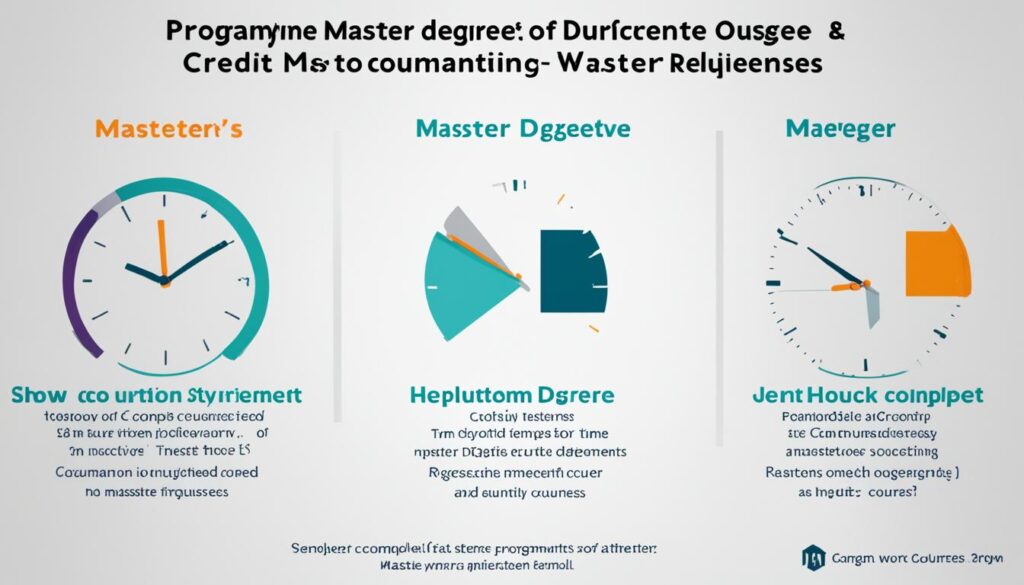Master’s degrees are highly sought after for their advanced knowledge and specialized skills in various fields. Whether you’re looking to advance your career or delve deeper into a specific subject, pursuing a master’s degree can open doors to new opportunities. But have you ever wondered exactly how long it takes to complete a master’s degree?
While the average timeframe for earning a master’s degree is typically around 2 years, it’s important to note that the duration can vary depending on several factors. The specific degree program, whether you’re studying full-time or part-time, and your personal goals all play a role in determining the length of your master’s degree journey.
Let’s dive deeper into the factors that can affect the length of a master’s degree program.
Key Takeaways:
- The average duration of a master’s degree program is around 2 years.
- The length of a master’s degree program can vary depending on the degree program, study status (full-time or part-time), and personal goals.
- Master’s degree programs typically require a range of credits, usually between 30 to 60, and may have additional requirements such as a thesis or capstone project.
- Online master’s degree programs offer more flexibility and can be completed in as little as 13 to 18 months.
- The length of a master’s degree program is ultimately determined by the individual and their circumstances.
Factors Affecting the Length of a Master’s Degree Program
The length of a master’s degree program can be influenced by several factors. One important factor is the curriculum of the program. Different programs may require varying amounts of credit hours to complete. Some programs may have a more extensive curriculum, which can extend the duration of the program. For example, programs that include a thesis or a capstone project often require additional time for research, writing, and presentation.
Another factor that affects the length of a master’s degree program is the status of the student. Whether you choose to study full-time or part-time can have a significant impact on the program’s duration. Full-time students typically take a heavier course load and complete their degree in a shorter timeframe, usually within 1-2 years. On the other hand, part-time students spread their coursework over a longer period, accommodating other personal or professional commitments.
Additionally, the choice between online and in-person classes can also influence the length of a master’s degree program. Online programs offer more flexibility in terms of scheduling, allowing students to complete their coursework at their own pace. This flexibility can enable students to fast-track their degree and finish in a shorter amount of time. In-person classes, while more structured, may have fixed schedules and require students to adhere to a specific timeframe determined by the institution.
To summarize, the length of a master’s degree program is influenced by several factors, including the curriculum, credit hours, the presence of a final project, part-time versus full-time study, and the mode of instruction (online or in-person). Each factor plays a role in determining the overall duration of the program. It is essential to consider these factors when choosing a master’s degree program that aligns with your goals and circumstances.

Is a 1-Year Master’s Degree Possible?
When it comes to obtaining a master’s degree, the thought of completing it in just 1 year may seem appealing. And while it is indeed possible to fast-track your way through an accelerated program or a dual-degree program, it is important to carefully consider the advantages and disadvantages and understand the trade-offs involved.
Accelerated programs and dual-degree programs can allow you to earn your master’s degree in a shorter amount of time. However, this typically means taking on a heavier course load, which can be challenging and demanding. You may have to sacrifice some of your other commitments in order to focus on your studies.
One thing to keep in mind is that a 1-year program may provide a more streamlined education, but it may also limit the depth and breadth of specialized knowledge and networking opportunities that come with a longer program. Building connections with professors, fellow students, and industry professionals can be invaluable for your future career.
In conclusion, while a 1-year master’s degree program can be an attractive option, it is crucial to weigh the advantages and disadvantages and carefully evaluate your career goals and personal circumstances. Consider the trade-offs involved and choose a program that aligns with your aspirations and offers the best learning experience for your future success.


